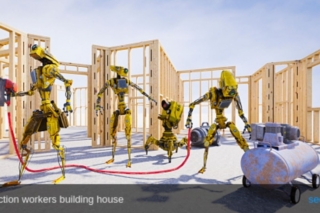“Nigeria’s construction industry is undergoing a quiet but powerful transformation. Smart buildings, powered by AI, IoT, and automation, are changing how we design, build, and experience real estate. From energy efficiency to security enhancements, this innovation is set to redefine the future of Nigerian infrastructure.”
Introduction: The Future of Construction in Nigeria
Nigeria’s construction sector is at a turning point. With increasing urbanization, rising energy costs, and a need for sustainable infrastructure, smart buildings have emerged as a revolutionary solution. These structures incorporate cutting-edge technologies such as the Internet of Things (IoT), artificial intelligence (AI), and automation to enhance efficiency, security, and sustainability.
This article explores the impact of smart buildings in Nigeria, the technologies driving this transformation, the benefits to homeowners, investors, and businesses, as well as challenges and future opportunities.
What Are Smart Buildings?
A smart building integrates automated processes to control various building operations, including heating, ventilation, air conditioning (HVAC), lighting, security, and other systems. These buildings leverage data from sensors, IoT devices, and AI-driven analytics to optimize efficiency and enhance user experience.
Key Features of Smart Buildings:
- Automated Energy Management: Reduces electricity consumption using AI-powered systems.
- IoT-Based Security Systems: Enhances safety through real-time monitoring and alerts.
- Sustainable Building Materials: Incorporates eco-friendly materials to minimize environmental impact.
- AI-Powered Space Optimization: Uses machine learning to improve workspace utilization.
- Remote Building Control: Enables homeowners and facility managers to monitor and adjust settings from mobile devices.
Why Nigeria Needs Smart Buildings
1. Urbanization and Population Growth
Nigeria’s urban population is expected to exceed 60% of the total population by 2050. With cities like Lagos and Abuja facing housing shortages and infrastructure strain, smart buildings offer a solution by optimizing available space and reducing operational costs.
2. Rising Energy Costs and Power Supply Issues
Nigeria’s electricity supply is inconsistent, forcing reliance on expensive alternatives like generators. Smart buildings incorporate solar panels, smart grids, and energy-efficient appliances to cut down costs and reduce dependence on non-renewable sources.
3. Security and Safety Concerns
With increasing security challenges in urban areas, smart buildings provide advanced safety solutions, including facial recognition, biometric access control, AI-powered CCTV systems, and automated emergency response mechanisms.
Smart Building Technologies in Nigeria
1. IoT-Based Energy Management Systems
- Smart meters monitor energy consumption in real-time and adjust usage based on demand.
- AI-powered HVAC systems optimize temperature settings, reducing energy waste.
2. Automated Security and Surveillance
- AI-driven facial recognition and biometric access enhance security.
- Smart cameras detect unusual activity and send instant alerts to authorities.
3. Sustainable and Green Building Technologies
- Smart lighting adjusts brightness based on occupancy and daylight availability.
- Water recycling systems reduce waste and improve efficiency in urban areas.
4. Modular and Prefabricated Construction
- Prefabricated smart buildings significantly reduce construction time and costs.
- Prefab materials incorporate insulation and energy-efficient components.
Case Studies: Smart Building Success in Nigeria
1. Eko Atlantic City, Lagos
Eko Atlantic is a modern smart city initiative integrating energy-efficient buildings, automated transport systems, and AI-driven infrastructure management.
2. Smart Estates in Abuja
Several new residential estates, such as the Aso Smart City project, incorporate IoT-based security systems, automated lighting, and solar energy solutions to provide sustainable housing.
The Future of Smart Construction in Nigeria
1. Government Policies and Regulations
The Nigerian government has introduced various incentives to promote sustainable construction, including tax breaks for green buildings and funding for smart infrastructure projects.
2. Investments in Smart Infrastructure
Foreign and local investors are increasingly funding smart city projects and high-tech residential developments.
3. Adoption of AI and Machine Learning in Construction
AI-driven predictive analytics will enhance decision-making in project planning and resource management.
Challenges Facing Smart Building Adoption in Nigeria
1. High Initial Investment Costs
The upfront costs of implementing smart technologies can be high, though long-term savings on energy and maintenance justify the investment.
2. Technical Expertise and Skilled Labor Shortage
There is a gap in local expertise for implementing and managing smart building technologies. Training programs and partnerships with global tech firms can address this issue.
3. Awareness and Acceptance
Many developers and homeowners are yet to fully understand the benefits of smart buildings, requiring increased awareness campaigns.
The Benefits of Smart Buildings
For Homeowners:
- Lower electricity bills and maintenance costs.
- Enhanced security with automated surveillance systems.
- Higher property value due to advanced infrastructure.
For Real Estate Investors:
- Higher ROI due to increasing demand for tech-driven properties.
- Reduced operational costs through energy efficiency.
- Future-proof assets in a competitive market.
For Businesses:
- Improved workspace efficiency and employee productivity.
- Reduced energy costs and enhanced sustainability.
- Smart office solutions, including AI-driven scheduling and climate control.
Industry Insights
Final Thoughts
Nigeria’s construction industry is evolving rapidly, and smart buildings are at the heart of this transformation. With advancements in AI, IoT, and sustainable building materials, the future of real estate in Nigeria is poised for unprecedented growth.
Embracing these innovations will not only benefit individual property owners but also contribute to the country’s overall economic and environmental sustainability. Now is the time for developers, investors, and policymakers to invest in the future of smart construction.
For expert insights on integrating smart technology into your next project, subscribe to our newsletter and stay informed on the latest industry trends.

